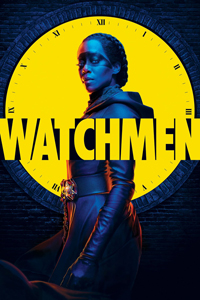Creator Damon Lindelof has taken the lessons learned on “Lost” – where time-jumping was a sometimes fun, sometimes hoary narrative device – and beautifully applied them to the nine-episode “Watchmen” (2019, HBO), a sequel to the comic/movie of the same name. Time is central to the “Watchmen” saga, the primary image of which is a clock counting down to the 1980s nuclear doomsday, especially with Dr. Manhattan existing outside of time as we mere mortals perceive it.
Jumping around the timeline
So on this series Lindelof and his team have a built-in excuse to jump around the timeline and reveal key information to us later rather than sooner. I enjoy how each bit of information brings the narrative closer to completion, like we’re putting together a jigsaw puzzle without looking at the picture on the box. It’s full of surprises, all of which make sense.
Like the comic/movie, the TV series studies the problem of superheroes that don’t have super morals. It starts off without the viewer knowing of any connections to comic writer Alan Moore’s original material (he declined to be credited for the 2009 movie or this series) other than the fact the comic/movie took place in 1985 and it’s now 34 years later.

“Watchmen” (2019)
HBO, 9 episodes
Creator: Damon Lindelof
Stars: Regina King, Yahya Abdul-Mateen II, Tom Mison
The slow and downbeat early episodes get us thinking about masks. The police wear masks in reaction to an incident where several officers were hunted down in their homes; only main character Angela/Sister Night (Regina King) and police chief Judd Crawford (Don Johnson) survived. So now all officers – including the superheroes in their ranks — wear masks to stay anonymous.
This image immediately made me uneasy as a viewer, as it is supposed to. It stirs up the seeming unaccountability in the real world where an officer will kill a citizen and get off without prison time. The 2019 of “Watchmen” – set primarily in Tulsa, Okla., although some action moves to the 51st state, Vietnam – is a gun-control-oriented authoritarian state wherein even the police don’t carry guns.
But a vote within their ranks allows them to temporarily arm themselves for “emergencies,” something that evokes on a smaller scale the post-9/11 executive orders for the supposed sake of safety and security.
Taking care of unfinished business
All of this is important world-building, but the early episodes are as bleak as you’d expect, with hardly any likable characters. Things turn around in a big way about mid-series as we get to know the current roster of superheroes …
(SPOILER WARNING.)
… and the superheroes from the movie/comic, plus the generation before that, the Minutemen.
The movie/comic leaves some unfinished business, as the Earth and humanity are saved from nuclear destruction, but at the cost of 3 million lives in New York City. Adrian Veidt/Ozymandius (Jeremy Irons in a delicious turn), the smartest man in the world, believes he is a hero for making this exchange on behalf of all humanity.

He believes he should face no legal consequences; the TV series doesn’t get into this conundrum until the very end, but it’s quite satisfying when it does. It’s the conclusion I didn’t consciously realize I wanted.
A difference between the comic and movie should be noted here: In the comic, Ozymandius drops a lab-grown squid monster on NYC. In the movie, he sets off a bomb. The TV series follows the comic’s portrayal and gives us some flashbacks.
TV sequel to the comic book
So technically this is a TV sequel to a comic book – the first such example. But it also owes a debt to the movie’s style, especially the use of waltzes and old pop songs – rather than action-oriented orchestration – to emphasize the deeper meaning of big moments rather than the immediate tension.
Also returning from the comic/movie are Laurie Blake/Silk Spectre (Jean Smart), now an FBI agent, and Cal/Jon Osterman/Dr. Manhattan (Yahya Abdul-Mateen II), now living a mortal life as the husband of Angela.
Although this god’s lack of perfection is a major theme in the “Watchmen” saga, Manhattan isn’t quite as culpable in the 1985 squid attack as Ozymandius is, and indeed he works to protect humanity from Ozymandius by sticking the latter on Europa, which he has terraformed.
There, Adrian lords over his servant clones, all known as Mr. Phillips (Tom Mison) and Miss Crookshanks (Sara Vickers). At first blush, this is the most unnecessary diversion of the TV series – especially considering how much time goes by before we learn this crazy man is Adrian and that he’s on Europa — but it does illustrate Adrian’s love of his godlike status and his desire for more.
I shouldn’t be too hard on tangential threads, though, because episode five, “Little Fear of Lightning,” about police officer Wade Tillman/Looking Glass (Tim Blake Nelson), is my favorite of the series. On a religious mission trip to New Jersey in 1985, Wade is tricked by a provocative female street thief and left naked and ashamed. Through Nelson’s rich and subtle performance, we see how that incident has traumatized him throughout his life.
The past informs the present
This episode is little more than a way to get to know a supporting character, although it does jibe with “Watchmen’s” message that the past informs the present. This idea comes through most strikingly via Angela’s grandfather, Will Reeves/Hooded Justice (a wonderfully weathered Louis Gossett Jr.).
As a superhero in the Minutemen days – as explored in episode six, “This Extraordinary Being” – young Will (Jovan Adepo) wears a mask so people won’t know he’s black. This gives him perhaps the only noble and sympathetic reason for wearing a mask out of all the show’s superheroes.
Hooded Justice is also the focal point for a theme specific to this TV version of “Watchmen”: racism. In episode six, Lindelof and his writing team give us a powerful story of what it’s like for a black cop in the 1940s, hated and hazed by his fellow officers and by white citizens and by black citizens who think he’s an Uncle Tom.
Overall, the series unpacks a lot about race and racism, from the controversial idea of reparations (“Redfordations” here, as Robert Redford is the president) to the casually presented fact that Angela and Cal have three adopted kids who are white.
But “Watchmen” lets us down in one way regarding this issue. Angela’s boss and best friend, Judd Crawford, is lynched in the first episode. Angela eventually learns the murder – by her grandfather, and in part via her husband’s instruction – is a revenge killing that stems from Crawford’s ancestors being in the Ku Klux Klan. Indeed, Crawford possesses a Klan robe in a hidden closet.
Victims can become villains
Judd might’ve been the most fascinating character of the whole series, someone who was taught to be racist but who finds himself being best buds with a black woman. But then he’s killed and we never get to know his motivations.
This is fair enough as a plot event, but the disappointing thing is that Angela is on the side of her husband and grandfather by the end. Aside from this apparent blind spot, “Watchmen” had been the type of show capable of recognizing the idea that someone whose family is steeped in racism could end up being a good person.
Through its main villain, the Vietnamese Lady Trieu (a fascinatingly straight-shooting Hong Chau), “Watchmen” recognizes that people who have been marginalized can still be in the wrong, even if their initial motivation is sympathetic.
Unlike the goals of Tulsa’s KKK-lite Seventh Kavalry (whose members wear Rorschach masks in a bastardization of the genuine hero of the comic/movie), Trieu’s aims are not clearly based on racism, such as wiping out white people – even though she loathes the white half of her parentage, the mildly racist Ozymandius.
A case could be made that “Watchmen” doesn’t want to go too far into the idea of reverse racism via Trieu, so it instead shifts back to the saga’s less complex core theme of power. Trieu aims to attain goddess status via the same device Dr. Manhattan used, but on purpose this time. Chau projects so much depth that it’s actually disappointing to learn Trieu is a mere powermonger. I subconsciously expected her to give some new perspective on racism.
Core message is still relevant
That’s not to say the core message of “Watchmen” is dated; it’s as relevant as ever. Trieu’s opposition — primarily in the form of Angela, Blake and Wade — believes no individual should have that much power. So the TV series flips the script from the comic/movie: The common non-superpowered folk reject a godlike leader rather than embracing or cowering before him/her. The lesson had seeped into them over the course of 34 years.
But for all the big statements, I think Angela, Will Reeves and “Watchmen” as a whole might’ve missed their most valuable lesson by under-exploring the police chief and giving his past more weight than his present.
People can grow beyond their past, and that might be our most valuable bulwark against continued societal racism. A 10th episode about Judd Crawford is the missing piece of the “Watchmen” puzzle.

